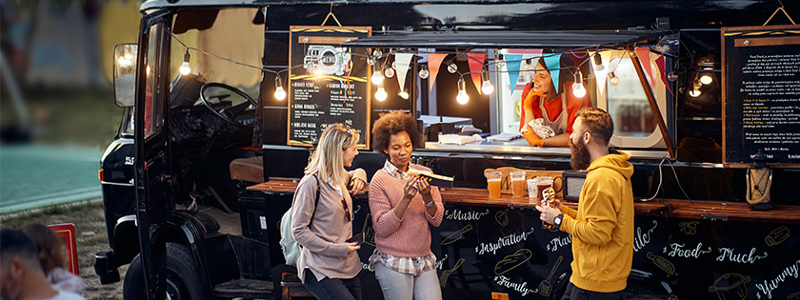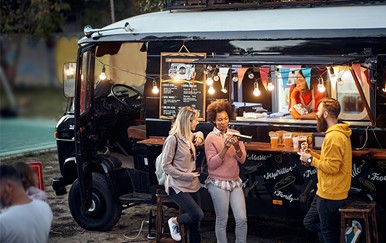As with a lot of foodies, the dream of opening a food truck that draws in crowds of people day after day is a big one. But for many, these dreams are put on hold because of worries, uncertainties and the dreaded ‘unknown’, especially when you start thinking about how much everything will cost.
Therefore, to give you the confidence to take that first step and pursue your dreams, we’ve created this handy little guide that outlines the majority of what you need to expect cost-wise, so you aren’t jumping into the industry blind.

Food truck cost
Perhaps the most obvious of start-up costs but, nonetheless, it’s one that needs to be stared straight in the eye because it’s likely going to be one of the higher expenses you’ll face on this journey.
A ballpark figure for buying a food truck in the UK can be anywhere from £5,000-£50,000, but the exact price will depend on the size and whether you go down the brand-spanking-new or used route. You’ll need to evaluate your needs and find what comfortably fits your budget.
One important thing to remember though is that this figure doesn’t include the price for decorating or outfitting the vehicle, so make sure you’ve factored in what your chosen truck wrap and additional equipment, for example, will cost beforehand.
Though, of course, if purchasing second hand your chosen vehicle might come with some equipment and accessories as a part of the package.
Insurance
For you, your business and even your employee’s protection, insurance is essential.
I can’t give you an exact price as quotes will vary depending on a variety of factors including your business type, value and age, as well as where it’s located, stored and what equipment is on board. It will also differ depending on what type of cover you opt for. We’d recommend getting cover for things such as, fire, theft and windscreen cover. With most companies, these are likely to come as standard, but you can also look into adding more specific cover such as public liability insurance and breakdown.
Any add-ons are likely to increase the price so try not to be too shocked when this happens. At the end of the day, to protect your interests you’ve got to have the correct insurance - make sure to get a catering van insurance quote direct with Lexham!
Permits and parking
When we focus on parking and permits, this doesn’t just mean where you’ll park during business hours. Though that is also important, especially when you find your regular patch, you’ll also need to think about off-duty parking, event parking (if you plan on attending them) and storage costs.
If you’re living and working in an urban area, you’ll know that space is already hard to come by and, therefore, that means any free space will come at a price.
Once the doors close and you shut up shop, where are you going to park? Do you have space on your drive? You do? Then that’s great! It means storage won’t cost you a penny but if you don’t, you may have to rent a space to store it, which comes with its own price tag. Things like this add up and will only increase those outlays.
As you can see, there will be many hoops to jump through before your van can legally get out on the road and start selling. I would suggest you always do your research before setting off – you don’t want to add parking tickets to your list of expenses.

Maintenance costs
This is especially relevant for those of you choosing to buy a used vehicle. You want to set aside a budget for future repair or maintenance costs because, in order to keep earning, your vehicle is going to need to be kept in relatively good health.
Essential equipment
It’s no secret, food trucks need equipment and, depending on your chosen dishes, even the basic equipment can become essential. You’ll need to dig deep into your perspective menu ideas and explore what tools are needed and how much of the budget you need to spare before they become a reality.
When talking about equipment, this doesn’t just include what you need to cook the food with – you’ll need to keep customers happy with more than tasty treats.
As more and more places go cashless, a good POS system is an essential piece of tech that will help lines move quickly, helping customers order and pay effortlessly and keep them coming back for more. A system like this can also provide reports to help you keep an eye on the day-to-day runnings of your business.
Catering equipment doesn’t come cheap, but you don’t always have to buy it brand-new, there are many places out there nowadays that offer second-hand, used or newly restored options, so you’ll want to do some research to see what’s out there and what bargains you can nab!
Running the van
So, you’ve got your van sorted, insurance and permits are all ticked off and, equipment-wise, you’re kitted out, ready to serve your specialty food, but have you thought about what it costs to actually run?
When it comes to running a food truck, wages, marketing, the costs of produce and supplies needed for serving and, most importantly, petrol are all things you need to plan and budget for accordingly.
When there are more exciting things to sort, like how you’re going to use Biscoff on the menu or what colour to paint the truck, it’s easy to overlook these and say to yourself you’ll worry about them closer to the time. Even though they are likely to differ week by week, or even month from month, you will still need to take into consideration and forecast how many staff members, what marketing assets, ingredients and how much petrol you can realistically afford before money starts returning to your pocket.

To finish
These are the basic costs you’ll need to factor in and consider before starting your own food truck business. If you are still feeling unsure or worried, our advice is to work out your budget and from there you’ll be able to get a clear idea of what you can and can’t afford.
If you want further advice, why not visit your local food market and get talking to some of the vendors. They’ll be able to give you a clearer idea of what your ins and outgoings will look like.
Related article

Pros and Cons of a Mobile Catering Business
Discover the pros and cons of starting and running a mobile catering business.
Read more








